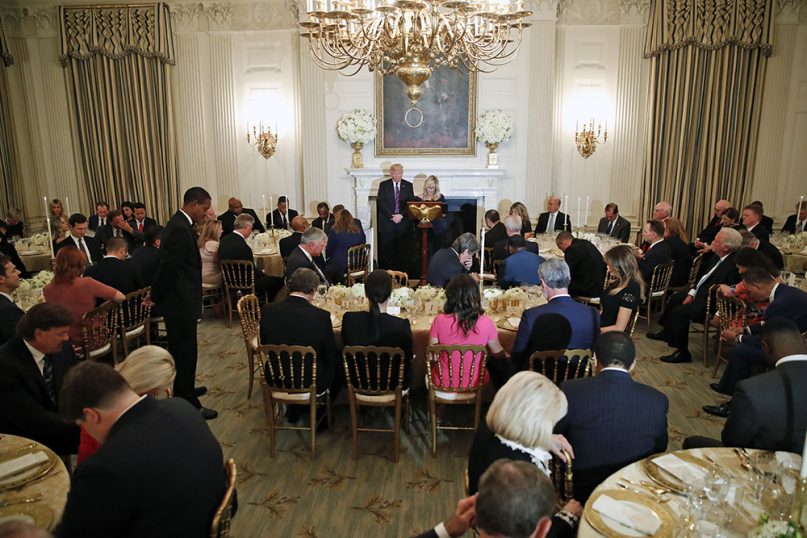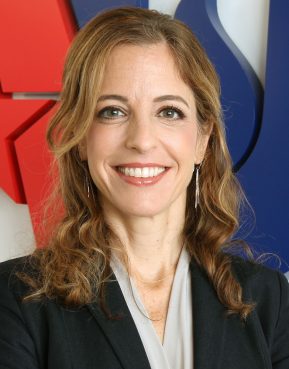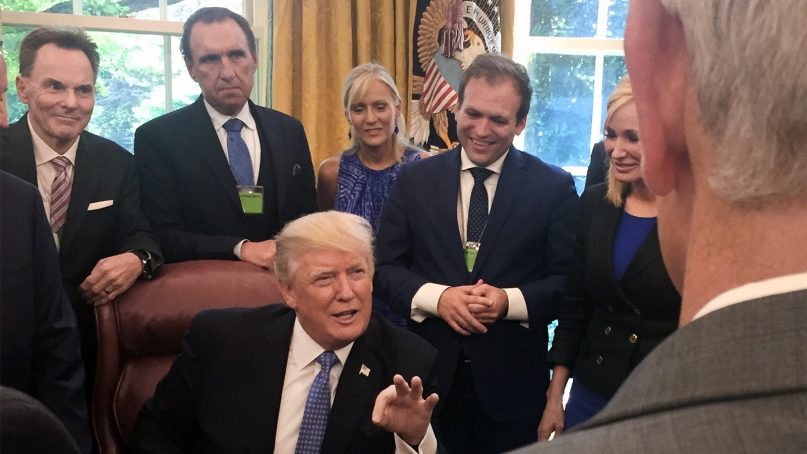WASHINGTON (RNS) — A church-state watchdog is demanding a halt to meetings between the Trump administration and an informal group of evangelical advisers who have proved to be among the president’s staunchest supporters.
Americans United for Separation of Church and State said the group is violating the Federal Advisory Committee Act, a 1972 law that provides transparency and procedural standards for committees created to meet with the executive branch. The watchdog called for a stop to the group’s meetings and advising “unless and until” it complies with the law.
“It is clear that the President’s Evangelical Advisory Board is doing substantive work with the Trump Administration behind closed doors — without any sunlight for the public to understand how and why decisions are being made,” wrote Americans United Associate Legal Director Alex J. Luchenitser in a Thursday (Aug. 30) letter addressed to White House counsel Don McGahn and other administration officials. It also was sent to Johnnie Moore, who has served as an unofficial spokesman for the evangelical group.
The letter comes in the same week that President Trump hosted a dinner for close to 100 evangelicals in the White House’s State Dining Room. The president welcomed them on Monday by saying “these are very special friends of mine, Evangelical pastors and leaders from all across the nation.” Ticking off the names of leaders in attendance, including Florida megachurch pastor Paula White, evangelist Franklin Graham and Liberty University President Jerry Falwell Jr., Trump added: “I know you, I watch you, I see you. Yours are the words we want to hear.”

President Trump bows his head in prayer as pastor Paula White leads the room in prayer during a dinner for evangelical leaders in the State Dining Room of the White House on Aug. 27, 2018, in Washington. (AP Photo/Alex Brandon)
Evangelicals who have met with the Trump administration have told Religion News Service they have discussed a range of policy issues, from abortion to transgender rights to international religious freedom.
“The Administration continues to engage hundreds of faith leaders on various issues that directly impact their communities,” Hogan Gidley, deputy press secretary, told RNS. “The White House does not have an Evangelical Advisory Board; instead, the President signed an Executive Order establishing the White House Faith and Opportunity Initiative that serves all faith-based communities.”
RELATED: All the president’s clergymen: A close look at Trump’s ‘unprecedented’ ties with evangelicals
Rachel Laser, president of Americans United, called for greater transparency about the advisers.
“President Trump has granted leaders of a narrow segment of one religion unprecedented influence on policy decisions that affect all of us,” said Laser. “Americans have a right to know that — and to have a government that works for everyone, not just some.”

Rachel Laser in January 2018. Photo by Rick Reinhard, courtesy Americans United
In the letter, Luchenitser said the activities of the advisory group “are well within FACA’s scope.”
Moore, responding to a request from RNS for comment, denied the group has any official capacity.
“There has never been — and I know of no plans for there to be — a White House Faith or Evangelical Council,” he said. “It is hard to shut something down that doesn’t legally exist!”
He said there has been “confusion” about the group because members of the media “innocently chose to carry over language used in the campaign into coverage of the administration, but that campaign council was officially disbanded after the campaign.” Moore also said Americans United’s complaint seems to primarily be a “fundraising ploy” by the watchdog.
Others have previously shunned the name “faith council” as an appropriate description. Dallas megachurch pastor Robert Jeffress has told RNS that would come with “certain legal ramifications.”
When press secretary Sarah Sanders responded to a question about a July 2017 meeting, at which photos appeared on social media of evangelical leaders praying for Trump, she defended the prayer and added: “It’s his Faith Advisory Board, and they meet from time to time to speak about issues that are important to that community.”
RELATED: White House honors evangelicals ‘for all the good work they do’
Melissa Rogers, the former director of President Obama’s White House Office of Faith-based and Neighborhood Partnerships, has told RNS the Obama administration’s faith-based councils produced public reports, held public meetings and were subject to the 1972 law. She tweeted on Tuesday after reports of this week’s dinner: “Once again, the Trump WH appears to favor evangelicals (more specifically, a partic kind of evangelical) over others, while claiming to promote religious freedom.”
Americans United also has sent Freedom of Information Act requests to 10 federal agencies seeking information about administration meetings and communications with the evangelical advisers. It also seeks to determine the sources of funding for the dinner.
Rob Boston, Americans United’s spokesman, said his advocacy group hopes for a response to its letter from the White House, though one is not required.
“The federal government does have to respond to our FOIA requests,” he said.
(RNS National Reporter Jack Jenkins contributed to this report.)





